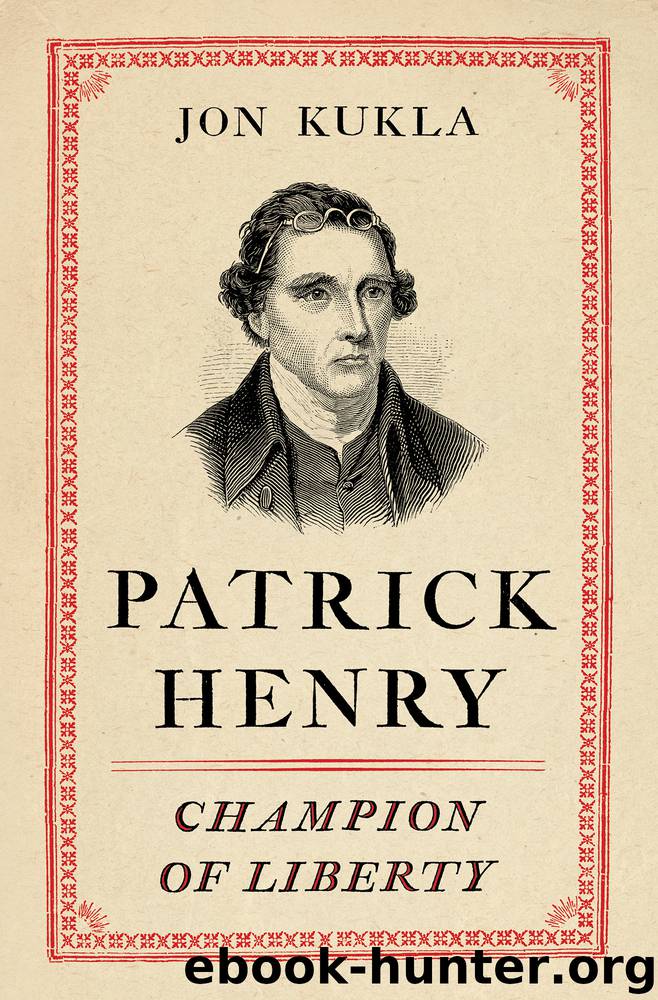Patrick Henry by Jon Kukla

Author:Jon Kukla
Language: eng
Format: epub
Publisher: Simon & Schuster
A year after Governor Henry crushed Arthur Campbell’s separatist schemes, he was confronted with recurrent skirmishes between Kentucky settlers and Wabash Indians in the Ohio Valley near Vincennes (in modern Indiana). Many of these incidents were triggered by Kentuckians encroaching upon the Indian territory ceded to Congress north of the Ohio River. “You are drawing so close to us,” one tribal chieftain complained, “that we can almost hear the noise of your axes felling our trees and settling our Country.” But the area’s tribes were also getting ammunition, supplies, and encouragement from British agents in Detroit. In the spring of 1786 several hundred Shawnee warriors began raiding south of the Ohio River near its confluence with the Miami River (just west of modern Cincinnati)—and when the Virginia militia prepared to respond, the Shawnee enlisted several other tribes in a combative alliance.
From Governor Henry’s perspective, Congress was not living up to its responsibilities both to protect settlers from Indian attack and to push the British to evacuate their forts on the Great Lakes in compliance with the peace treaty of 1783. When Henry reported the attacks near Vincennes to Congress in May, he complained of its “seeming inattention” to Indian affairs and specifically its failure either to have negotiated a treaty with the Wabash or at least “given [him] Notice of a hostile Disposition among them.” That same day, Henry wrote the Virginia delegation and urged Congress to send troops against the Wabash for “experience clearly proves that attacking their towns is the only mode of effectual defence.” In addition to his belief that Congress should share the expense and send a federal army to assist the Kentucky militia, Henry was carefully fulfilling the requirement of Article VI of the Articles of Confederation, which stipulated that unless they were under imminent attack the states must petition Congress for assistance before engaging in military action.
Congress referred Henry’s letter to a committee comprised of William Grayson, James Monroe, and Massachusetts delegate Nathan Dane, whose sympathy for Virginia’s needs arose from a shared desire for congressional military support: Dane and the Bay State delegation wanted Congress to send troops to assist in the suppression of Shays’ Rebellion—a mission for which Virginia was the only state that offered troops and resources. On the recommendation of Grayson’s committee, Congress agreed to raise two companies under the command of Philadelphia-born Colonel Josiah Harmar, who had served under Washington and Light-Horse Harry Lee during the Revolution and was now senior officer of the U.S. Army. Congress dispatched Harmar to the Ohio River, near modern Louisville, but it did not authorize his use of force. A skeptical Yankee congressman wrote that the committee proposal had been “more hostile than we conceived existing Circumstances would warrant,” but that “a soothing answer however is to be given to the Governor of Virginia.”
Download
This site does not store any files on its server. We only index and link to content provided by other sites. Please contact the content providers to delete copyright contents if any and email us, we'll remove relevant links or contents immediately.
Fanny Burney by Claire Harman(26602)
Empire of the Sikhs by Patwant Singh(23084)
Out of India by Michael Foss(16853)
Leonardo da Vinci by Walter Isaacson(13336)
Small Great Things by Jodi Picoult(7140)
The Six Wives Of Henry VIII (WOMEN IN HISTORY) by Fraser Antonia(5515)
The Wind in My Hair by Masih Alinejad(5095)
A Higher Loyalty: Truth, Lies, and Leadership by James Comey(4962)
The Crown by Robert Lacey(4814)
The Lonely City by Olivia Laing(4801)
Millionaire: The Philanderer, Gambler, and Duelist Who Invented Modern Finance by Janet Gleeson(4478)
The Iron Duke by The Iron Duke(4354)
Papillon (English) by Henri Charrière(4274)
Sticky Fingers by Joe Hagan(4198)
Joan of Arc by Mary Gordon(4109)
Alive: The Story of the Andes Survivors by Piers Paul Read(4031)
Stalin by Stephen Kotkin(3965)
Aleister Crowley: The Biography by Tobias Churton(3640)
Ants Among Elephants by Sujatha Gidla(3467)
